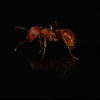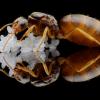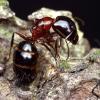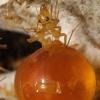- Formiculture.com
- Forums
- Gallery
- Members
- Member Map
- Chat
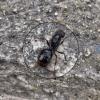
Basics about lasius alienus
Started By
Vanko
, Mar 29 2017 9:45 AM
12 replies to this topic
#1
 Offline
-
Posted March 29 2017 - 9:45 AM
Offline
-
Posted March 29 2017 - 9:45 AM
Could you tell my some info about this species? If you could find any really topic, which is already rotten about this species, please give me a link.
😛 🐜 😛
#2
 Offline
-
Posted March 29 2017 - 9:57 AM
Offline
-
Posted March 29 2017 - 9:57 AM
Lasius alienus is easy to care for, like most other Lasius sp.
If you've enjoyed using my expertise and identifications, please do not create undue ecological risk by releasing your ants. The environment which we keep our pet insects is alien and oftentimes unsanitary, so ensure that wild populations stay safe by giving your ants the best care you can manage for the rest of their lives, as we must do with any other pet.
Exotic ants are for those who think that vibrant diversity is something you need to pay money to see. It is illegal to transport live ants across state lines.
----
Black lives still matter.
#3
 Offline
-
Posted March 29 2017 - 2:10 PM
Offline
-
Posted March 29 2017 - 2:10 PM
Lasius alenius are normally found in wooded areas. The workers are a bit smaller than lasius neoniger workers. Also, the workers are darker. They are easy to care for, just like lasius neoniger.
#4
 Offline
-
Posted March 29 2017 - 2:13 PM
Offline
-
Posted March 29 2017 - 2:13 PM
Lasius alenius are normally found in wooded areas. The workers are a bit smaller than lasius neoniger workers. Also, the workers are darker. They are easy to care for, just like lasius neoniger.
They are found in wooded areas only in North America. They are more open-loving in Eurasia.
#5
 Offline
-
Posted March 30 2017 - 5:23 AM
Offline
-
Posted March 30 2017 - 5:23 AM
I has large colony of Lasius alienus colony.
As someone else said, they're easy to care for just like other Lasius sp.
Mine have readily accepted sugar water and nectar, as well as almost all of the feeder insects such as (but not limited to) dubia roaches, crickets, and fruit flies.

I was considering writing up a care sheet for them. They're one of my favored species.
- Nathant2131, Cindy and JuanBlack like this
#6
 Offline
-
Posted March 30 2017 - 7:49 AM
Offline
-
Posted March 30 2017 - 7:49 AM
Thanks! I will read it.
Lock this topic.
Lock this topic.
😛 🐜 😛
#8
 Offline
-
Posted May 12 2018 - 11:00 AM
Offline
-
Posted May 12 2018 - 11:00 AM
I has large colony of Lasius alienus colony.
As someone else said, they're easy to care for just like other Lasius sp.
Mine have readily accepted sugar water and nectar, as well as almost all of the feeder insects such as (but not limited to) dubia roaches, crickets, and fruit flies.
I was considering writing up a care sheet for them. They're one of my favored species.
Did you ever writing the care sheet up? I’m looking to start a new colony of them.
#9
 Offline
-
Posted May 12 2018 - 11:07 AM
Offline
-
Posted May 12 2018 - 11:07 AM
I has large colony of Lasius alienus colony.
As someone else said, they're easy to care for just like other Lasius sp.
Mine have readily accepted sugar water and nectar, as well as almost all of the feeder insects such as (but not limited to) dubia roaches, crickets, and fruit flies.
I was considering writing up a care sheet for them. They're one of my favored species.
Did you ever writing the care sheet up? I’m looking to start a new colony of them.
Care is identical for lasius neoniger, go off of this, http://www.formicult...asius-neoniger/
- noebl1 likes this
#10
 Offline
-
Posted May 12 2018 - 7:55 PM
Offline
-
Posted May 12 2018 - 7:55 PM
I love how everyone clumps any lasius sp into care sheets. Little is known about l.alienus; they are not like l.flavus or l.neoniger and are most likely parasitic..
By 'they're the same' they mean they don't like to be rolled or tapered with, and they probably do well with PROTEIN PROTEIN PROTEIN as they co-hab with others and probably feed off them for nutrition.
By 'they're the same' they mean they don't like to be rolled or tapered with, and they probably do well with PROTEIN PROTEIN PROTEIN as they co-hab with others and probably feed off them for nutrition.
Edited by StayLoki, May 12 2018 - 8:09 PM.
#11
 Offline
-
Posted May 12 2018 - 8:38 PM
Offline
-
Posted May 12 2018 - 8:38 PM
Huh? I’m pretty sure they’re not parasitic lol, but they are known to sometimes be polygynous. I just feed my colonies mealworms and honey and they’re fine.
#12
 Offline
-
Posted May 13 2018 - 12:28 PM
Offline
-
Posted May 13 2018 - 12:28 PM
I love how everyone clumps any lasius sp into care sheets. Little is known about l.alienus; they are not like l.flavus or l.neoniger and are most likely parasitic..
By 'they're the same' they mean they don't like to be rolled or tapered with, and they probably do well with PROTEIN PROTEIN PROTEIN as they co-hab with others and probably feed off them for nutrition.
Lasius alienus is well known to be a fully claustral, non-parasitic species. Multiple people have kept them too. Where did you get this falsified information?
Huh? I’m pretty sure they’re not parasitic lol, but they are known to sometimes be polygynous. I just feed my colonies mealworms and honey and they’re fine.
Do yours have workers finally?
#13
 Offline
-
Posted May 13 2018 - 2:33 PM
Offline
-
Posted May 13 2018 - 2:33 PM
I love how everyone clumps any lasius sp into care sheets. Little is known about l.alienus; they are not like l.flavus or l.neoniger and are most likely parasitic..
By 'they're the same' they mean they don't like to be rolled or tapered with, and they probably do well with PROTEIN PROTEIN PROTEIN as they co-hab with others and probably feed off them for nutrition.
Lasius alienus is well known to be a fully claustral, non-parasitic species. Multiple people have kept them too. Where did you get this falsified information?Huh? I’m pretty sure they’re not parasitic lol, but they are known to sometimes be polygynous. I just feed my colonies mealworms and honey and they’re fine.
Do yours have workers finally?
Yes they do. 8/10 of the original queens are still alive, and 4/8 of them have workers, the other 4 only have eggs because of lack of heating.
0 user(s) are reading this topic
0 members, 0 guests, 0 anonymous users





